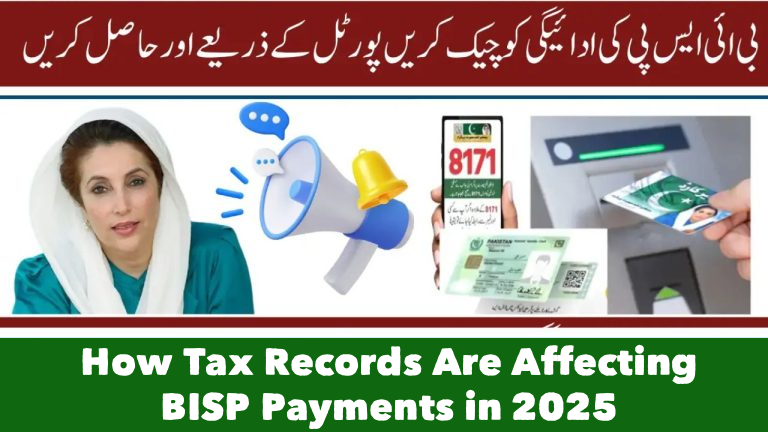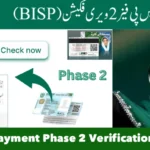
Introduction
In 2025, how tax records are affecting BISP payments is becoming a critical concern for many beneficiaries across Pakistan. The Benazir Income Support Programme (BISP) aims to provide financial assistance to low-income families, but recent changes in government policy now link tax records more closely to eligibility and payment processes. This article explores how these tax records impact BISP payments in 2025, what beneficiaries should be aware of, and how to navigate these changes effectively.
Understanding BISP and Its Importance in Pakistan
The Benazir Income Support Programme (BISP) is a vital government initiative that offers cash transfers to impoverished families, helping them meet basic needs and improve their quality of life. The program targets women and vulnerable households to promote social welfare and economic stability. Every year, BISP payments uplift millions of families, making it one of the most important social safety nets in Pakistan.
The Rising Role of Tax Records in BISP Payments
Traditionally, BISP eligibility was primarily determined by socio-economic surveys and income assessments. However, in 2025, the government has introduced stricter checks involving tax records. This measure aims to improve transparency, ensure that benefits reach genuinely deserving individuals, and prevent fraud.
Tax records now influence BISP payments by cross-checking if beneficiaries or their family members have reported taxable income or assets above certain thresholds. Those who have significant taxable income may face suspension or reduction of BISP payments. This new linkage reflects the government’s attempt to reconcile social welfare goals with fiscal responsibility.
Why Has the Government Linked Tax Records to BISP Payments?
Linking tax records to BISP payments addresses several key objectives:
- Reduce misuse of funds: By verifying tax records, the government seeks to limit payments to those who do not require this support.
- Enhance fairness: Ensuring only eligible families benefit prevents wealthier households from unfairly receiving assistance.
- Improve data accuracy: Tax records provide an additional data source to cross-verify financial status.
- Boost government revenue: Encourages beneficiaries with taxable incomes to fulfill their tax obligations.
How Tax Records Are Affecting BISP Payments in 2025
The impact is significant in several ways:
- Ineligibility for some beneficiaries: Families found to have taxable income above set limits may lose access to BISP payments.
- Payment delays: Tax verifications may cause delays as data matching and validation take time.
- Requests for updated documentation: Beneficiaries might need to provide updated income proofs or tax declarations to continue receiving support.
- Increased scrutiny: Greater data-sharing between the Federal Board of Revenue (FBR) and BISP has heightened monitoring.
What Beneficiaries Should Do to Ensure Continued BISP Payments
For beneficiaries worried about how tax records are affecting BISP payments, some proactive steps can help:
- Update and verify your information: Ensure that income and family details submitted to BISP are accurate and up to date.
- Keep track of tax filings: If you or your family members generate taxable income, stay compliant with tax regulations.
- Communicate with BISP officials: If you receive any notices or payment suspensions, contact BISP promptly to understand and resolve the issue.
- Avoid providing false information: Transparency is crucial. Misreporting could result in permanent disqualification.
How BISP Is Adapting to These Changes
BISP has introduced several measures to make the transition smooth:
- Data integration with FBR: To speed up verification and reduce errors.
- Awareness campaigns: Educating beneficiaries about tax obligations and eligibility criteria.
- Grievance redressal mechanisms: Providing support for disputes or appeals regarding payment suspensions.
- Flexible payment schedules: Accommodating beneficiaries whose payments are delayed due to verification.
Potential Challenges and Concerns
While linking tax records to BISP payments enhances accountability, it also raises some challenges:
- Risk of excluding genuinely needy families: Some households may have taxable income from sporadic sources but still require welfare support.
- Technical issues: Errors in data matching or system glitches may cause wrongful payment suspensions.
- Privacy concerns: Increased data sharing between government agencies necessitates strict data protection measures.
- Awareness gap: Many recipients may not fully understand the new procedure and requirements.
The Future of BISP and Tax Records Linkage
As Pakistan strives to improve the efficiency and fairness of social protection programs, the integration of tax records with BISP payments is likely to deepen. Continued improvements in technology, data sharing, and public outreach will be essential in ensuring that the system benefits the right people without unnecessary hurdles.
FAQs About How Tax Records Are Affecting BISP Payments in 2025
Q1: Why is the government using tax records to verify BISP payments?
A1: To enhance transparency, prevent fraud, and ensure that benefits go to the truly needy by cross-checking income information with tax data.
Q2: What happens if my family has taxable income but I still need BISP support?
A2: You should contact BISP and provide accurate documentation. Some families with taxable income but still in need may qualify for exceptions after review.
Q3: Can incorrect tax information affect my BISP payments?
A3: Yes, discrepancies or errors may delay or suspend payments, so it’s vital to keep tax and personal records updated.
Q4: How can I update my income information for BISP?
A4: You can update your details through BISP’s official centers or online portals, ensuring your records reflect true income status.
Q5: Is there any appeal process if BISP payments are stopped due to tax record checks?
A5: Yes, BISP provides mechanisms to appeal or clarify your case if you believe payments were incorrectly suspended.
Conclusion
How tax records are affecting BISP payments in 2025 marks an important shift in Pakistan’s social welfare landscape. This integration aims to strengthen the program’s transparency and effectiveness, ensuring assistance reaches the deserving while reducing misuse. Beneficiaries need to stay informed, maintain clear and accurate records, and cooperate with official processes to continue benefiting from BISP. By understanding these changes, families can better navigate the complexities and secure their financial support in 2025 and beyond.

